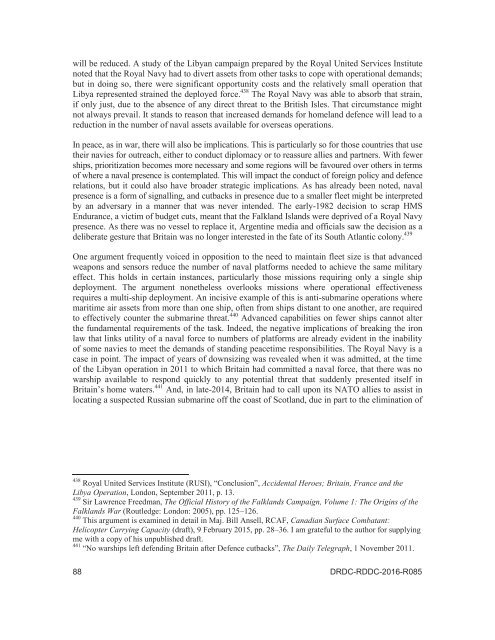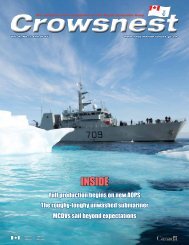Create successful ePaper yourself
Turn your PDF publications into a flip-book with our unique Google optimized e-Paper software.
will be reduced. A study <strong>of</strong> <strong>the</strong> Libyan campaign prepared by <strong>the</strong> Royal United Services Institute<br />
noted that <strong>the</strong> Royal Navy had to divert assets from o<strong>the</strong>r tasks to cope with operational dem<strong>and</strong>s;<br />
but in doing so, <strong>the</strong>re were significant opportunity costs <strong>and</strong> <strong>the</strong> relatively small operation that<br />
Libya represented strained <strong>the</strong> deployed force. 438 <strong>The</strong> Royal Navy was able to absorb that strain,<br />
if only just, due to <strong>the</strong> absence <strong>of</strong> any direct threat to <strong>the</strong> British Isles. That circumstance might<br />
not always prevail. It st<strong>and</strong>s to reason that increased dem<strong>and</strong>s for homel<strong>and</strong> defence will lead to a<br />
reduction in <strong>the</strong> number <strong>of</strong> naval assets available for overseas operations.<br />
In peace, as in war, <strong>the</strong>re will also be implications. This is particularly so for those countries that use<br />
<strong>the</strong>ir navies for outreach, ei<strong>the</strong>r to conduct diplomacy or to reassure allies <strong>and</strong> partners. With fewer<br />
ships, prioritization becomes more necessary <strong>and</strong> some regions will be favoured over o<strong>the</strong>rs in terms<br />
<strong>of</strong> where a naval presence is contemplated. This will impact <strong>the</strong> conduct <strong>of</strong> foreign policy <strong>and</strong> defence<br />
relations, but it could also have broader strategic implications. As has already been noted, naval<br />
presence is a form <strong>of</strong> signalling, <strong>and</strong> cutbacks in presence due to a smaller fleet might be interpreted<br />
by an adversary in a manner that was never intended. <strong>The</strong> early-1982 decision to scrap HMS<br />
Endurance, a victim <strong>of</strong> budget cuts, meant that <strong>the</strong> Falkl<strong>and</strong> Isl<strong>and</strong>s were deprived <strong>of</strong> a Royal Navy<br />
presence. As <strong>the</strong>re was no vessel to replace it, Argentine media <strong>and</strong> <strong>of</strong>ficials saw <strong>the</strong> decision as a<br />
deliberate gesture that Britain was no longer interested in <strong>the</strong> fate <strong>of</strong> its South Atlantic colony. 439<br />
One argument frequently voiced in opposition to <strong>the</strong> need to maintain fleet size is that advanced<br />
weapons <strong>and</strong> sensors reduce <strong>the</strong> number <strong>of</strong> naval platforms needed to achieve <strong>the</strong> same military<br />
effect. This holds in certain instances, particularly those missions requiring only a single ship<br />
deployment. <strong>The</strong> argument none<strong>the</strong>less overlooks missions where operational effectiveness<br />
requires a multi-ship deployment. An incisive example <strong>of</strong> this is anti-submarine operations where<br />
maritime air assets from more than one ship, <strong>of</strong>ten from ships distant to one ano<strong>the</strong>r, are required<br />
to effectively counter <strong>the</strong> submarine threat. 440 Advanced capabilities on fewer ships cannot alter<br />
<strong>the</strong> fundamental requirements <strong>of</strong> <strong>the</strong> task. Indeed, <strong>the</strong> negative implications <strong>of</strong> breaking <strong>the</strong> iron<br />
law that links utility <strong>of</strong> a naval force to numbers <strong>of</strong> platforms are already evident in <strong>the</strong> inability<br />
<strong>of</strong> some navies to meet <strong>the</strong> dem<strong>and</strong>s <strong>of</strong> st<strong>and</strong>ing peacetime responsibilities. <strong>The</strong> Royal Navy is a<br />
case in point. <strong>The</strong> impact <strong>of</strong> years <strong>of</strong> downsizing was revealed when it was admitted, at <strong>the</strong> time<br />
<strong>of</strong> <strong>the</strong> Libyan operation in 2011 to which Britain had committed a naval force, that <strong>the</strong>re was no<br />
warship available to respond quickly to any potential threat that suddenly presented itself in<br />
Britain’s home waters. 441 And, in late-2014, Britain had to call upon its NATO allies to assist in<br />
locating a suspected Russian submarine <strong>of</strong>f <strong>the</strong> coast <strong>of</strong> Scotl<strong>and</strong>, due in part to <strong>the</strong> elimination <strong>of</strong><br />
438 Royal United Services Institute (RUSI), “Conclusion”, Accidental Heroes; Britain, France <strong>and</strong> <strong>the</strong><br />
Libya Operation, London, September 2011, p. 13.<br />
439 Sir Lawrence Freedman, <strong>The</strong> Official History <strong>of</strong> <strong>the</strong> Falkl<strong>and</strong>s Campaign, Volume 1: <strong>The</strong> Origins <strong>of</strong> <strong>the</strong><br />
Falkl<strong>and</strong>s War (Routledge: London: 2005), pp. 125–126.<br />
440 This argument is examined in detail in Maj. Bill Ansell, RCAF, Canadian Surface Combatant:<br />
Helicopter Carrying Capacity (draft), 9 February 2015, pp. 28–36. I am grateful to <strong>the</strong> author for supplying<br />
me with a copy <strong>of</strong> his unpublished draft.<br />
441 “No warships left defending Britain after Defence cutbacks”, <strong>The</strong> Daily Telegraph, 1 November 2011.<br />
88 DRDC-RDDC-2016-R085




